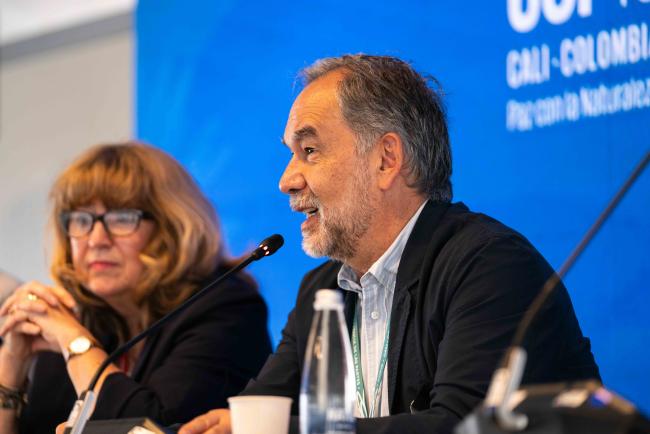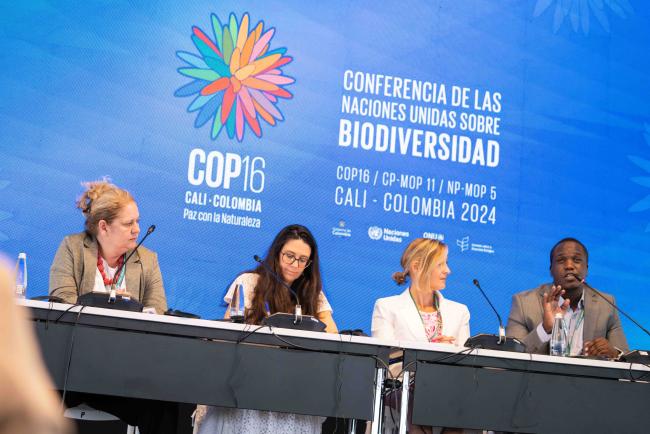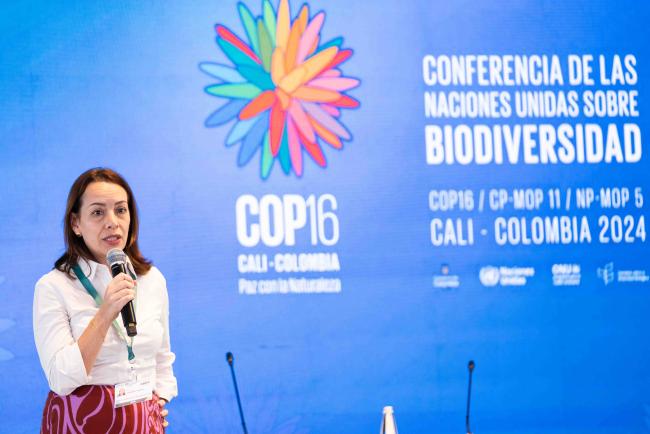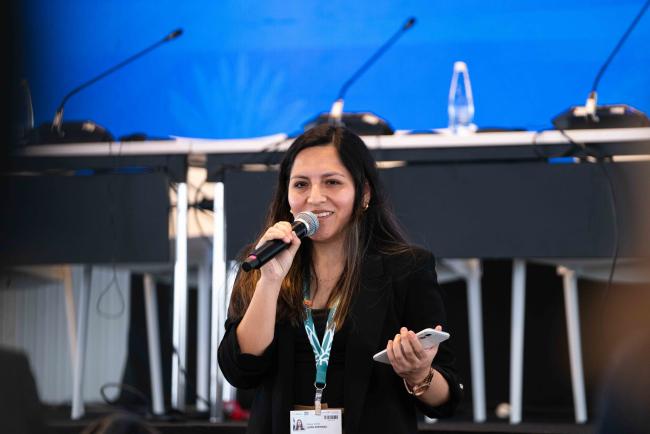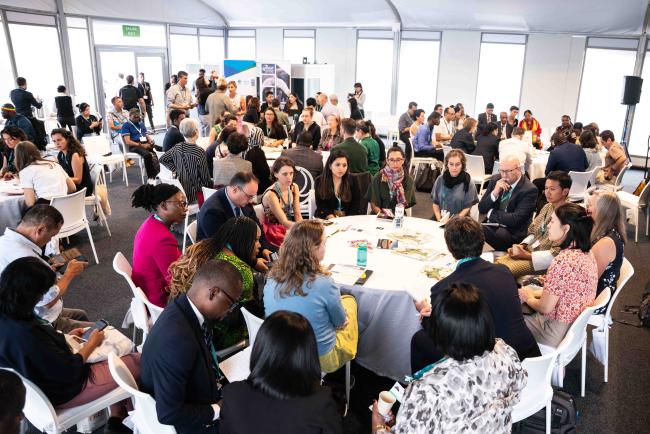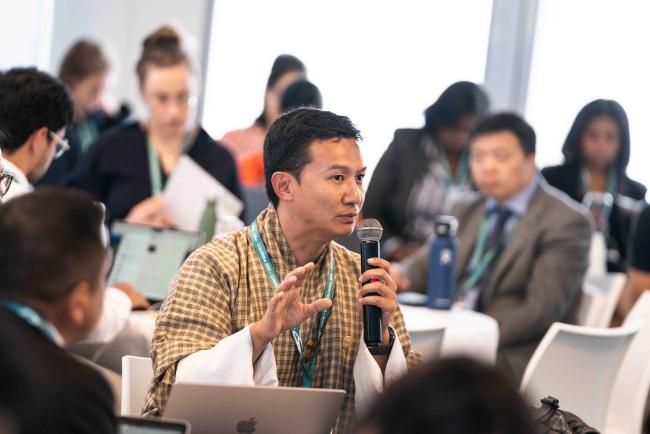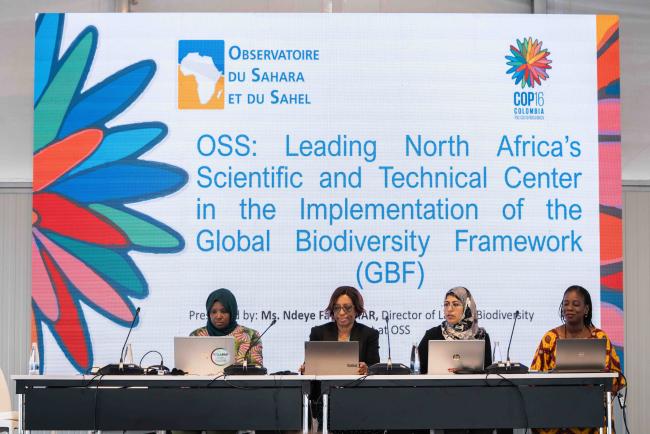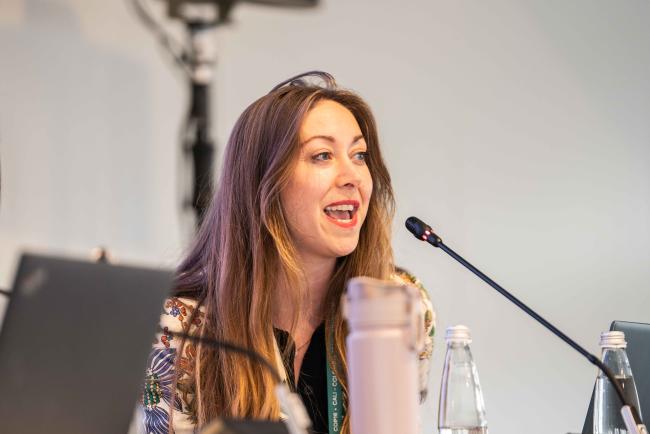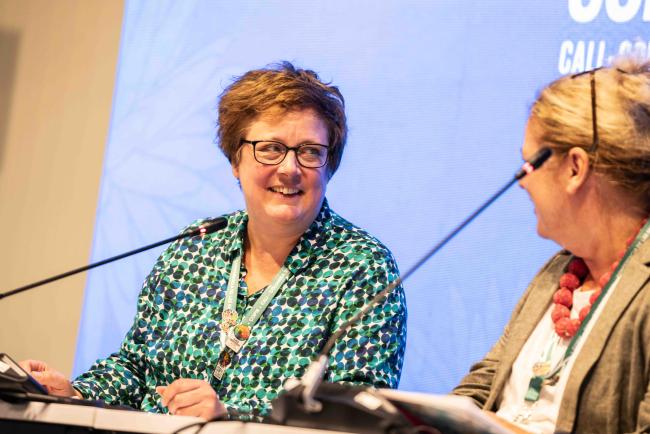About
Against a backdrop of urgent calls for action to halt and reverse biodiversity loss, more than 300 stakeholders participated in a day-long event on advancing implementation of National Biodiversity Strategies and Action Plans (NBSAPs). The day included presentations, interactive dialogues, and roundtables, with an emphasis on shared experiences and active engagement.
Astrid Schomaker, CBD Executive Secretary, set the stage by highlighting the Kunming-Montreal Global Biodiversity Framework (GBF) as a “game changer” for biodiversity. She underscored the need for broader, cross-cutting approaches that go beyond areas of focus, including protected areas, and to rethink our relationship with nature. She also highlighted that, although climate change and biodiversity loss are two sides of the same coin, the nature crisis is more complex, and that both breadth and complexity need to be reflected in NBSAPs. Recognizing that complexity makes it more challenging for countries to implement the GBF, she argued that implementation must be accelerated.
Mauricio Cabrera Leal, Vice Minister of the Environment, Colombia, emphasized the need for a whole-of-government, whole-of-society approach. He shared examples from Colombia, including a series of stakeholder consultations that included women, Indigenous Peoples and local communities (IPLCs), farmers, academia, and youth. He said the road to implementation must go through genuine engagement to bring legitimacy to the plans.
Setting the Stage: NBSAPs and GBF Targets
Katherine Madden, NBSAP Accelerator Partnership (AP), moderated a panel discussion on progress on national goals and targets and updates to NBSAPs. Noting that 100 national targets had been established and 35 NBSAPs completed, Madden asked panelists for their reactions. Jillian Campbell, CBD Secretariat, emphasized that work on national targets also reflects work on NBSAPs. She emphasized the high degree of alignment with GBF targets, the use of quantitative targets, and potential gaps in specificity, including understanding which areas are being protected, how IPLCs are being engaged, and limited references to youth and gender.
Christina Supples, GEF Global Biodiversity Framework Early Action Support, UN Development Programme (UNDP), said the GBF has helped increase understanding of the importance of NBSAPs. She called the push to have “hard conversations” about the barriers halting progress a “bright spot.” She also lauded work by Mexico, Bahrain, and Guatemala on stakeholder engagement.
Anthony Kamau, UN Environment Programe (UNEP), said the increasing number of NBSAPs creates hope, irrespective of the challenges associated with a whole-of-government, whole-of-society approach. He emphasized the need to tailor the way that support is provided, and highlighted the additional resources in the Eighth Replenishment of the Global Environment Facility (GEF-8) to help countries finalize their NBSAPs.
In response to a question from a participant from the Seychelles about the “disconnect” between NGOs and governments, panelists pointed to the importance of engagement on NBSAP implementation over the six-year period, and the need for increased coordination at the global level, capacity building, and partnerships.
Turning NBSAPs into Reality
During presentations and roundtables, participants focused on ways to overcome obstacles in achieving biodiversity mainstreaming.
Presentations: Marcela Quintero, Alliance of Bioversity International and the International Center for Tropical Agriculture (CIAT), presented on mainstreaming nature through economic sectors, political agendas, and societal values. She highlighted efforts and results from the NBSAP AP Rapid Capacity Needs Assessment, the Subsidiary Body for Technical and Technological Advice (SBSTTA), and the 2024 Regional Dialogue on NBSAPs for Latin American held in Lima, Peru, in June. In addition to noting the importance of the agricultural sector, she emphasized the need to: increase financial and technical capacity; obtain better data; increase linkages to a human-rights based approach; and develop more tools to cover gaps in biodiversity-inclusive planning.
During the ensuing interactive section, five speakers shared their experiences, each highlighting the importance of a whole-of-government, whole-of-society approach.
Jazzy Rasolojaona, Natural Justice, Madagascar, emphasized integrating human rights-based approaches in planning and implementing NBSAPs. He underscored the need for legal and non-legal cross-cutting tools and approaches, including: policy and legal reforms and development; empowerment of communities; benefit-sharing agreements; advocacy; technical support; and safeguarding measures that can be used by public and private actors, funders/donors, conservation organizations, and technical partners.
Kongchay Phimmakong, Ministry of Education and Sports, Lao People's Democratic Republic, focused on progress on and challenges of implementing access and benefit sharing (ABS). She said potential biodiversity users are not always forthcoming with the information required, noting the CBD could play a bigger role in user compliance, and suggested creating an online ABS provider/user guide.
Brenda Izidio, Brazilian chapter of the Global Youth Biodiversity Network (GYBN), described the youth community’s experience in participating in Brazil’s NBSAP process, noting that youth is now a recognized stakeholder at the National Biodiversity Commission. She also noted widespread consultations, leading to documents that also propose sub-national level NBSAPs.
Musye Svieta Lucen Espinoza, GYBN chapter in Peru, highlighted that youth is a transversal community, and that youth groups have pushed for greater participation in Peru’s NBSAP process. She said the youth community has much to contribute, noting their biggest challenge is resource mobilization.
Mohamed Ali Ben Temessek, Ministry of Environment/General Direction of Environment and Quality of Life, Tunisia, highlighted the multiple threats to his country’s rich biodiversity and ecosystems, including habitat loss, pollution, overexploitation, and climate change. On actions taken to align national policies with the GBF, he cited strengthening, expanding, and effectively managing protected areas, and promoting sustainable agriculture, fishing, and tourism practices. He also underscored the need to include local perspectives, especially gender considerations, in decision-making processes.
Roundtables: Participants considered the need for, and challenges related to, mainstreaming biodiversity across different issues and sectors during small group discussions.
On finance, Marcos Cerezo, Guatemala, reported that discussions focused on how to mobilize national budgets for biodiversity mainstreaming, resulting in three recommendations: align NBSAPs and national development plans and frameworks; reduce negative incentives and increase positive incentives, particularly in relation to agriculture; and use finance as a connector for better integrating NBSAP and Nationally Determined Contribution (NDCs) processes and implementation.
On nature and climate linkages, Nathan Mesnildrey, NDC Partnership, reported on positive examples of countries already working to increase synergies between climate and biodiversity beyond GBF Target 8 (climate resilience), and on synergies that reduce transactional costs for both biodiversity and climate action. The discussion also stressed the critical role of capacity building to address a gap in government officials’ awareness, training, and skills.
On whole-of-society and human rights approaches, Lena Katzmarski, German Agency for International Cooperation (GIZ), reported agreement that including different stakeholders in the NBSAP implementation process is “the only way,” even though doing so is a central challenge of the whole-of-government approach. Recommendations included: translating the GBF into national languages; institutionalizing the rights of IPLCs with respect to participation; and using third-party facilitators.
On agriculture and food systems, Chris Dickens, International Water Management Institute, CGIAR, shared five key implementation challenges: resource gaps; social and political instability; data gaps; effective participation; and lack of transparency. The group agreed that, moving forward, countries must take multi-sectoral approaches when updating NBSAPs.
On peace with nature, Jimena Puyana, UNDP Colombia, reported that, although there is a recognition of the “philosophical importance of the topic,” more agreement on what peace with nature means is needed, as there are different types of conflicts that should be considered in GBF implementation. The group also stressed the impact of production chains on social and environmental conflicts.
Regional and Sub-regional Technical and Scientific Support Centres (TSCs): Representatives of TSCs highlighted challenges and experiences related to implementing national monitoring frameworks, and the potential role of TSCs in supporting implementation.
Speakers included: Han De Koeijer, Royal Belgian Institute of Natural Sciences; Amanda Wheatley, Secretariat of the Pacific Regional Environment Programme; Farai Tererai, South African National Biodiversity Institute; Grégoire Dubois, European Commission Knowledge Center for Biodiversity; and Claudia Binondo, ASEAN Centre for Biodiversity. Speakers identified as needs: written assessments of capacity-building needs; reducing the reporting burden and streamlining the process in a way that works for countries; enhancing and supporting existing data tools and platforms, while ensuring the needs of individual countries are met; addressing data gaps; data tools and information sharing mechanisms that are sustainable, scalable, easily accessible, and user-friendly; and mobilizing resources to enhance and maintain national monitoring systems.
Integration of Traditional Knowledge and Other Knowledge into Monitoring Systems: Maurizio Farhan Ferrari, Forest Peoples Programme, acknowledged several community-based monitoring projects around the world. He highlighted that data produced by these projects often remain local, so the challenge is integration in national monitoring systems. He shared recent developments at the CBD that can encourage integration of local knowledge, including the recognition of IPLCs across GBF goals and targets and the fruitful collaborations between SBSTTA and the Ad Hoc Open-ended Working Group on Article 8(j) on traditional knowledge indicators. He also highlighted the Indigenous Navigator, an online data tool designed for and by Indigenous Peoples that now includes a survey focused on the GBF.
Technical and Scientific Support Centres: During this panel session, moderated by Ndeye Fatou Mar, Sahara and Sahel Observatory, Tunisia, representatives from TSCs in Africa shared efforts on capacity building and technical assistance, policy and strategy development, monitoring and reporting, and regional cooperation.
Marieme Diallo, Centre de Suivi Écologique, Senegal, reported on the Ecosystem Natural Capital Accounting tool for integrating and synthesizing biophysical and socioeconomic data. She highlighted its use for assessing ecosystem status and resilience, including changes related to deforestation, droughts, climate change, and road construction in wildlife corridors, and at the global level for facilitating the implementation, monitoring, and reporting of international commitments.
Bouchara Fari, Morocco, shared her country’s work on aligning NBSAPs and national biodiversity targets with the World Conservation Database, assessment and development of monitoring action plans, a stakeholder mapping and consultation process, including women, youth, and local populations, and updating national targets.
Adja Sy Seydi, Coordinator, Observatory for Biodiversity and Protected Areas in West Africa (OBAPAO), highlighted work on governance, development of web platforms, a study on biodiversity-related indicators, and creating a red list of species and ecosystems to harmonize monitoring and restoration actions.
Catalysts for Action: Driving NBSAP Implementation Forward
Devonne Goad, NBSAP AP, moderated the panel on programmes, tools and services that support NBSAP progress.
Nathan Mesnildrey, NDC Partnership, said that the partnership now has 220 members, including 120 countries. He described the country engagement strategy as their “core work,” noting that finance work has expanded to engage non-traditional partners, including private sector finance. He also emphasized building long-term embedded advisory capacity within governments, and the recent creation of a last-resort fund to support projects not picked up by other partners but deemed a priority by the government.
Odile Conchou, High Ambition Coalition for Nature and People, outlined the focus on supporting the 30x30 goal (to protect at least 30% of the world's land and oceans by 2030), and highlighted political action, events, regional workshops, and a 30x30 knowledge sharing platform. She also noted their matchmaking tool designed to connect members with organizations and support in designing technical requests.
Tanya McGregor spoke about GEF-8 funding, including the Early Action Support Project, which helps fast track actions towards preparation of NBSAPs, and the BIOFIN initiative. She noted that GEF funds can be used to support efforts at sub-regional and local levels within the country, and noted their efforts to be available for consultation at major CBD meetings.
Marion Marigo, UNDP, said they are working to put parties at the center of everything they are doing. She said needs assessments can be streamlined, even while recognizing that each initiative has its own goals. She also highlighted gender mainstreaming as a priority identified by countries, peer-to-peer exchanges, and the potential use of emerging technologies, such as artificial intelligence to help countries assess their degree of alignment between national biodiversity targets and the GBF.
Toasting to Hope and Launch of the NBSAP Accelerator Partnership Facilitator Programme
During the final session, Katherine Madden summarized highlights from the day. Inka Gnittke, Federal Ministry for the Environment, Nature Conservation, Nuclear Safety and Consumer Protection, Germany, emphasized the importance of the NBSAP AP, including its Facilitator Programme, for enhancing biodiversity action and multi-stakeholder coordination, and its Matchmaking Mechanism, which will connect biodiversity needs with financial, technical, and knowledge resources. She announced that a second cohort of 12 countries will soon be selected to receive facilitators, further expanding the programme’s reach, and encouraged invited countries and institutions to apply for the facilitator programme.
Organizers: NBSAP AP, GEF Early Action Support Project, UNDP, UNEP, UNEP-WCMC, GIZ, CGIAR Initiative on NEXUS Gains, and Alliance of Bioversity International and CIAT, and the CBD Secretariat
Contact: Diego Ochoa, UNDP diego.ochoa@undp.org
For more information: https://www.cbd.int/conferences/2024/parallel-meetings/kmgbf-pavilion-nbsap-day
To receive free coverage of global environmental events delivered to your inbox, subscribe to the ENB Update newsletter.
All ENB photos are free to use with attribution. For the 2024 UN Biodiversity Conference, please use: Photo by IISD/ENB | Mika Schroder

